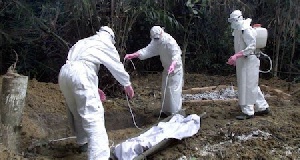The head of the UN mission charged with fighting Ebola in West Africa has told the BBC he does not yet have the resources necessary to defeat it.
Tony Banbury said more help was urgently needed, despite significant contributions from the UK, China, Cuba and the US.
But he was hopeful of achieving the target of 70% bed space for new cases and 70% safe burials by December.
The confirmed death toll is now 4,818, says the World Health Organization.
The numbers are down since the WHO previously reported figures last Friday, as it says it has changed the way the figures are collated.
But it said in the countries worst affected by the outbreak - Liberia, Sierra Leone and Guinea - transmission remained "persistent and widespread, particularly in the capital cities".
'Mixed picture'
Mr Banbury was speaking at the UN headquarters for Ebola response in Ghana, which has not been affected by the epidemic, at the end of a regional tour.
He told the BBC it was difficult to say if the spread of the disease is slowing as it was a "very mixed picture".
In Liberia's capital, Monrovia, there was a decline but there was "significant acceleration" elsewhere.
The WHO says that of the planned 4,707 beds in Ebola treatment centres, only 22% are operational - blaming delays on insufficient numbers of foreign medical teams.
"The bed space issue is huge," Mr Banbury admitted, but he said he hoped that by reducing the numbers of people becoming infected, the UN would eventually be able to reach its targets.
He said his organisation did not yet have the capacity to defeat the disease.
"It's not here yet. There are still people, villages, towns [and] areas that [are] not getting any type of help right now and we definitely don't have the response capability on the ground now from the international community," he said.
At the same time he mentioned contributions from the UK, which opened a new Ebola centre in Sierra Leone on Wednesday.
'Ultimate price'
Mr Banbury said the US, China and Cuba which had all sent significant numbers of soldiers or medics.
Earlier, US officials said President Barack Obama would ask Congress for $6.2bn (£3.9bn) to fight Ebola in West Africa and to avoid it spreading in the US.
They said he was requesting $4.5bn in immediate response funds and more than $1.5bn for a contingency fund.
In Liberia, a 25-bed Ebola centre set up by the US army to treat health care workers was officially opened in Monrovia on Wednesday by President Ellen Johnson Sirleaf.
According to the WHO, 546 healthcare workers have been infected with Ebola since the outbreak began, of whom 310 have died.
The Liberian president said these frontline staff would now have a "refuge".
"You all know that those have suffered - we say 'most' - because they were trained to preserve life and they gave life," she said.
"The doctors and the nurses and... key healthcare workers who actually went out there not knowing what they were dealing with but demonstrating their professionalism and their service and they paid the ultimate price."
General News of Friday, 7 November 2014
Source: BBC

















